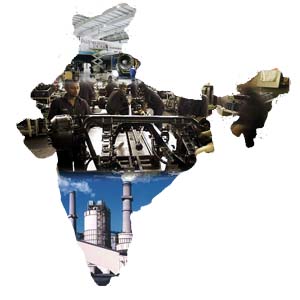The Importance of Industrial Growth
Upon hearing the term economy vis-a-vis our country, the word that goes around is that
India is on its way to become the fastest growing economy in the world” And I assure you that if a survey is conducted among the youth regarding the economic status of our country, a majority would make the quoted statement. And why would they not? Our economists predict it, the newspapers say it and well there is a fairly likely possibility that we shall live to witness this much awaited day.
But there are certain terms and conditions, rules and regulations that must be adhered to even while procuring prosperity and proliferation. As per the basics of economics, the economy of a country is generally demarcated into three sectors namely the Primary or Agricultural sector, the Secondary or Industrial sector (which mostly involves manufacturing) and the Tertiary or Service sector.
Now the intriguing tale of our economy is that as per the estimation in the year 2010, of the total labour force, the agricultural sector employs a 52%, a 34% is employed by the service sector whilst the industrial sector employs a mere 14%. Yet this sector is responsible for 28.6% of the GDP which is twice the percent of the labour it sustains. Clearly the industrial sector is a promising one but is not given enough emphasis. Now let just take a look at what manufacturing is and its importance in our day-to-day life as well as for the economy :
Imagine a life where one fine morning we wake up, as hungry as we are the thought of crisply toasted bread springs up to which the belly grumbles. So we look in the cupboard and think “what’s this?” That’s the look on our face when we find wheat instead of bread, not even the powered wheat but the whole crop itself. Fortunately we don’t face such dire situations in our times. We wake up and there is the bread, like all the other goods, exactly how we want it, waiting to be consumed by us.
Back to the scenario where we find the crop. Now this crop, the raw material derived from nature has to be processed to obtain the intermediate product, refined powdered wheat, which then depending upon the final product desired is further processed into various consumptives available in markets, one of which is the bread on our plate. This is where
manufacturing” comes into play. The intermediate stage in the transformation of not only wheat into bread but all the other goods, accessible to us, from their respective raw materials.
“Manufacturing involves the process that requires assembling of raw materials, modifying them into secondary products and furnishing them into final products for consumption by the use of machines, tools and labour.” It generally indulges human activity from handicraft to industrial production, all on a large scale. Prior to Industrial revolution, manufacturing industry worked in a disintegrated fashion:
- Assembling of the raw material occurred at a place.
- The assembled raw material transported to factory for modification.
- The modified product then transported to a workplace for finished product.
This made it a time consuming and expensive process. These problems were solved with industrial revolution when the entire process was brought under one roof. This improvised the industrial sector to a great extent as industrial revolution made the entire process cost and time efficient. Apart from that, it also widened the much needed employment opportunities.
In a country like ours, one of the crucial assets is the human resource, which we fail to utilize for obtaining optimum outcome. The sad part is that foreign companies independently or in collaboration with the public companies use their advanced technology to derive the utmost benefits of our human resource. They procure the raw materials from our county and other third world countries at cheap prices, manufacture via their industrial establishments or by purchasing small scale manufacturers, that too at reasonable prices in India and sell the finished products to us in our own markets at exorbitant rates making profit.
The terms and conditions of which I mentioned earlier are nothing but the balanced development of the three sectors, equally, so that we don’t lag behind in either which I hope shall be incorporated in the 12th five-year plan so that we truly proclaim the title of the world’s fastest growing economy. Hence I say a life without manufacturing is one with wheat without bread.




